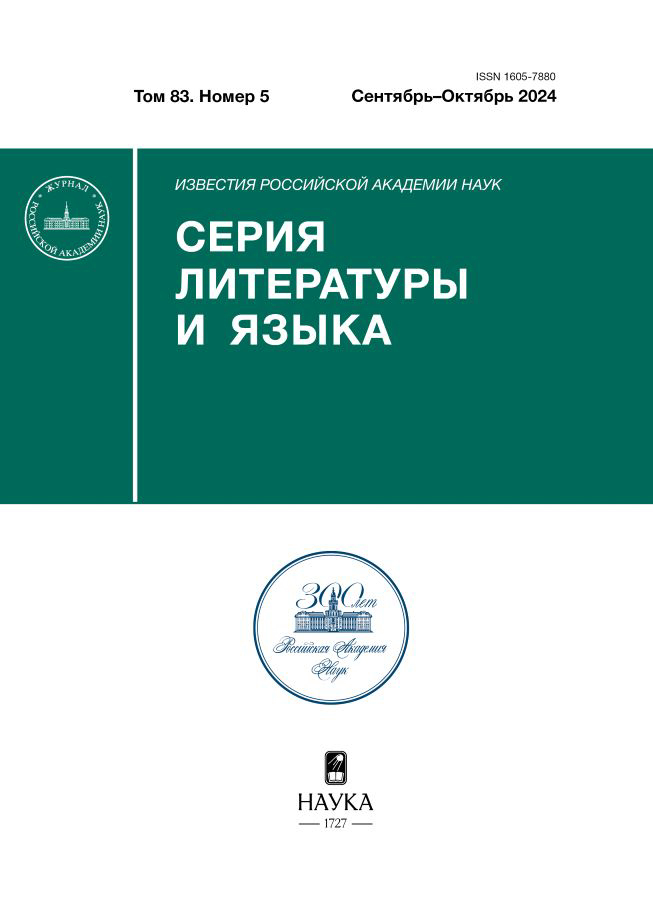Epic word: a comparative analysis of the nominations of the world in the Elder and Younger Eddas
- Авторлар: Toporova T.V.1
-
Мекемелер:
- Institute of Linguistics of the Russian Academy of Sciences
- Шығарылым: Том 83, № 5 (2024)
- Беттер: 73-84
- Бөлім: Articles
- URL: https://rjonco.com/1605-7880/article/view/657040
- DOI: https://doi.org/10.31857/S1605788024050069
- ID: 657040
Дәйексөз келтіру
Аннотация
The authorʼs goal is to compare the nominations of the world in the “Elder” and “Younger Edda”, including three types of objects: lexeme (hel, Hel ‘hel; owner of another worldʼ), combination of words (Ginnunga gap ‘gaping abyssʼ), composite (Ás-garðr ‘aces' fenced spaceʼ, etc.). A comparison of the designations of the world in the analyzed texts is quite justified, since only the “Elder” and “Younger Edda” represent a corpus of texts reflecting information about Scandinavian mythology as a system, therefore, in the absence of data from other Old Germanic areas, they become the only source for the reconstruction of German mythology, meaning which is difficult to overestimate. In addition, references to the “Elder Edda” constantly appear in the “Younger Edda”, therefore, the idea of comparison seemed relevant to its author himself, and experts have no right to ignore this circumstance. The research method is implemented in a scheme for describing an epic word, which arose on the basis of lexicological studies of a number of key concepts in the ancient Indian “Rigveda” and a thesaurus description of a folk word, which have undergone fundamental processing. Summing up the results of the comparative analysis of the designations of the world in the “Elder” and “Younger Eddas”, we can state a more archaic stage recorded in the Old Icelandic prose monument, manifested in the presence of nominations of the original loci of cosmogenesis (Mú-spellz-heimr ‘points (in space) destruction of the worldʼ, Nifl-heimr ‘fog worldʼ) and the place of their interaction (the World Abyss), the description of which as an object of the cosmic universe is given in sufficient detail; in the presentation of the opposition between one’s own and someone else’s space, fundamental to the mythopoetic model of the world (Mið-garðr ‘middle enclosed space’ – Út-garðr ‘outer enclosed space’); a more detailed and specific description of the corresponding lexemes and a wider range of their mythological connotations, as well as the factor of theocentrism, in which the reference point is the location of the dwelling of the gods (Ás-garðr ‘the enclosed space of the Asesʼ), for example, in relation to hel ‘another world, the afterlife’.
Толық мәтін
Авторлар туралы
Tatyana Toporova
Institute of Linguistics of the Russian Academy of Sciences
Хат алмасуға жауапты Автор.
Email: t1960@list.ru
Doct. Sci. (Philol.), Leading Researcher
Ресей, 1 Bld. 1, Bolshoy Kislovsky Lane, Moscow, 125009Әдебиет тізімі
- Edda. Die Lieder des Codex Regius nebst verwandten Denkmälern. Hrsg. von Gustav Neckel. I. Text. Vierte, umgearbeitete Auflage von Hans Kuhn. Heidelberg, 1962.
- Starshaya Edda. Drevneislandskie pesni o bogah i geroyah. Perevod A.I. Korsuna. Redakciya, vstupitelnaya statya i kommentarii M.I. Steblin-Kamenskogo [The Elder Edda. Old Icelandic Songs About Gods and Heroes. A.I. Korsunʼs Translation. Ed., Intr., Comm. M.I. Steblin-Kamensky]. Moscow, Leningrad: Publishing house of Academy of Sciences of the USSR, 1963. (In Russ.)
- Snorri Sturluson. Edda. Udg. Af Finnur Jónsson. København: Forlagt af Universitetsboghandler G. E. C. GAD, trykt hos Nielsen & Lydiche, 1900.
- Mladshaya Edda. Izd. podgot. O.A. Smirnickaya, M.I. Steblin-Kamenskij [The Younger Edda. Eds. O.A. Smirnickaya, M.I. Steblin-Kamensky]. Moscow: Nauka Publ., 1970. (In Russ.)
- Mify narodov mira. Enciklopediya. 2 t. [Myths of the Peoples of the World. Encyclopedia]. Moscow: Spovetskaya Encyclopedia Publ, 1980–1982. (In Russ.)
- Elizarenkova, T.Ya. Slova i veshchi v Rigvede [Words and Things in the Rig Veda]. Moscow: Eastern Literature Publ., 1999. (In Russ.)
- Nikitina, S.E. O mnogoznachnosti, diffuzii znachenij i sinonimii v tezauruse yazyka folklora [On Polysemy, Diffusion of Meanings and Synonymy in the Thesaurus of the Folklore Language]. Oblik slova. Sbornik statej pamyati Dmitriya Nikolaevicha Shmelyova [Shape of the Word. Collection of Articles in Memory of Dmitry Nikolaevich Shmelev]. Moscow, 1997, pp. 360–373. (In Russ.)
- Folklornaya leksikografiya. Otv. red. A.T. Hrolenko [Folklore Lexicography 1994. Rep. ed. A.T. Khrolenko]. Kursk: KSPI Publ., 1994. Issue 1. (In Russ.)
- Toporova, T.V. Principy opisaniya epicheskogo slova: koncept gory v “Starshej Edde” [Principles of Describing the Epic Word: The Concept of a Mountain in the Elder Edda]. Moscow: Academy of Humanitarian Research Publ., 2006. (In Russ.)
Қосымша файлдар









